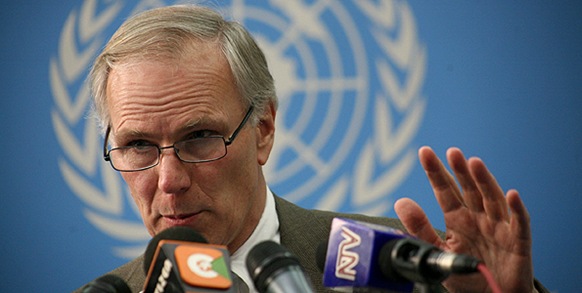 United Nations special envoy, Prof. Philip Alston, stressed the need for international inquiries into serious allegations of extrajudicial executions in cases where national probes have been insufficient, citing Sri Lanka, among other nations. Mr. Alston also referred to the allegations that as many as 30,000 people were killed in Sri Lanka last year in the closing months of the conflict between Government forces and Tamil rebels and that grave violations of human rights and humanitarian law were committed. “In this case also there is a need for an independent international inquiry,” UN News Center reported, quoting Alston. Professor Francis A Boyle commented after Alston’s statement that "U.N. Secretary General Ban Ki-Moon no longer has any excuse to delay appointing an International War Crimes Committee on Sri Lanka, which has been within his powers to do for the past year now."
United Nations special envoy, Prof. Philip Alston, stressed the need for international inquiries into serious allegations of extrajudicial executions in cases where national probes have been insufficient, citing Sri Lanka, among other nations. Mr. Alston also referred to the allegations that as many as 30,000 people were killed in Sri Lanka last year in the closing months of the conflict between Government forces and Tamil rebels and that grave violations of human rights and humanitarian law were committed. “In this case also there is a need for an independent international inquiry,” UN News Center reported, quoting Alston. Professor Francis A Boyle commented after Alston’s statement that "U.N. Secretary General Ban Ki-Moon no longer has any excuse to delay appointing an International War Crimes Committee on Sri Lanka, which has been within his powers to do for the past year now."
“While the Council rejected this proposal a year ago, there is now a great deal of new evidence which would warrant effective action,” Alston, UN’s Special Rapporteur on extrajudicial executions, told the media after presenting his reports for 2009 and 2010 to the 14th Session of the UN Human Rights Council on 3-4 June 2010.
Commenting on Alston’s statements, Professor Francis A. Boyle, an expert in International Law at the University of Illinois said, "Mr. Alston is an official United Nations Special Rapporteur appointed by the United Nations Human Rights Council as an expert in the field of human rights. He has now openly and publicly stated his official position that the Government of Sri Lanka’s internal investigation of the massacre it perpetrated on the Tamils in Wanni a year ago is legally inadequate under basic standards of international law.
 "The conclusion is inevitable that U. N. Secretary General Ban Ki-Moon no longer has any excuse to delay appointing an International War Crimes Committee on Sri Lanka, which has been within his powers to do for the past year now.
"The conclusion is inevitable that U. N. Secretary General Ban Ki-Moon no longer has any excuse to delay appointing an International War Crimes Committee on Sri Lanka, which has been within his powers to do for the past year now.
"Unfortunately, it appears that the Obama administration is going along with Ban Ki-Moon’s stalling tactics for reasons of realpolitik outlined in the Senate Foreign Relations Committee Report that are antithetical to basic principles of international law and human rights," Prof. Boyle said.
Boyle then proferred his advice to the American Tamil activists.
"Under these circumstances, Tamil American Citizens must locate at least one Member of the United States House of Representatives willing to introduce a Bill into Congress providing that no U.S. money shall be paid to the United Nations Organization as dues or otherwise until Ban Ki-Moon appoints an International War Crimes Committee to investigate Sri Lanka that is composed of objective and neutral and independent international law and human rights experts with full powers to make a comprehensive investigation and publicly release their Report.
"These same type of hard-ball political tactics by the U.S. Congress were necessary in order to get U. N. Secretary General Kofi Annan to release the U.N. Report on the Srebrenica Massacre. It is time for the United States Congress to force Ban Ki-Moon to do the right thing here for the Tamils. Obviously, the Obama administration will not do so," Boyle said.
"It is up to Tamil American Citizens to get this political Agenda organized in the U.S. Congress. They have the Power. They must use it. The Tamils in Wanni deserve no less than their maximum efforts to obtain accountability for the GOSL’s genocide there," Boyle added.
(For updates you can share with your friends, follow TNN on Facebook and Twitter )
